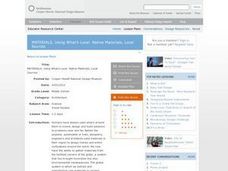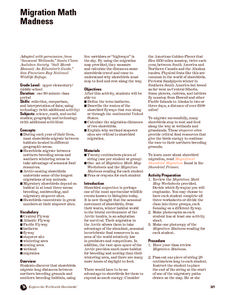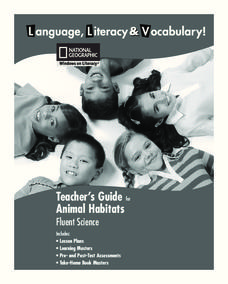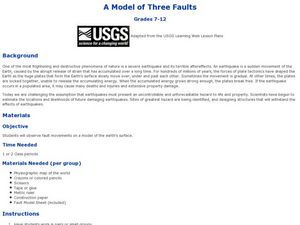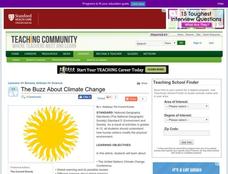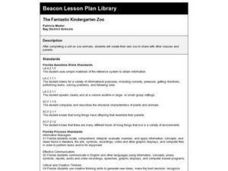Curated OER
Infusing Equity by Gender into the Classroom
Students discover the biases between the two genders by comparing males and females in different species. In this gender identity lesson, students research National Geographic Magazine and view videos demonstrating the differences...
Curated OER
MATERIALS, Using What’s Local: Native Materials, Local Sources
Students consider the development of different societies. In this environmental building activity, students consider local resources and how societies choose to use them. Students use their findings to design a 'green' building for use...
Curated OER
Fostering Geospatial Thinking: Space to Earth: Earth to Space (SEES)
Students locate and access data to help them with their science inquiry. In this geographical positioning lesson students evaluate and compare data sets.
Curated OER
Adopt a Geographic News Story
Learners explore geography and the environment by reading the news. They discuss why it is important to follow the news. Students adopt a geographic news story, research the topic, and design posters to illustrate the story.
Earth Day Network
The Neolithic Revolution
With the abundance of food products we can easily access in our society today, it is easy to forget the toll this can take on our global environment. Young learners will discover how the transition to agriculture and domesticated living...
Curated OER
Canada 2050: Future Population Trends
Students analyze population data and a population pyramid projection for Canada. They make predictions of future society and economic trends.
Curated OER
Africanized Honey Bees And Society
Students investigate how information is disseminated about honey bees and other insects. They make a list of key words and phrases, or even write a brief summary of their impressions of insects and their relatives after viewing the movie.
Prince William Network
Migration Math Madness
A great way to incorporate math into life science, this instructional activity has learners measure migratory routes on a map and calculate the actual distance that shorebirds on the routes would cover. Learners compute the distance...
Curated OER
Water Resources and the Role of the Independent Sector
Students identify the need to maintain and protect our natural resources. In this natural resource lesson, students study pictures of the effects of pollution on animals and water. Students brainstorm a list of ways water is an...
Curated OER
Garbage/Solid Waste Disposal
Students examine the problem of solid waste disposal in modern society. They decide on a site for waste disposal. They investigate the many different types of waste that need to be dealt with. They participate in three learning station...
Curated OER
Comparing Amount of Rainfall in Different Geographical Areas
Students construct rain gauges and use them to log rainfall in their school zone, local city, and region and then compare and discuss them by plotting this information.
Curated OER
Is Urban Sprawl Causing Us To Lose More Than Ground?
Young scholars map the changes that occur in the land as a result of urban sprawl. They explore the problems that paving and building have on the watershed and the habitats on the Northshore.
National Geographic
Animal Habitats
Explore animal habitats and reinforce speaking, listening, reading comprehension, and writing skills with a unit that focuses on the Arctic, desert, ocean, prairie, and rainforest. Enthusiastic scientists read informational text to...
Curated OER
A Model of Three Faults
Students observe fault movements on model of the Earth's surface, find fault movements associated with different types of plate boundaries, research examples of non-plate boundary faults, and research and report on the types of faults...
Curated OER
Force of Habitat
Plants and animals of the desert are the subject of this lesson. While the activities involve an exploration involving Nevada, this resource could be altered for use with any area. This detailed lesson includes a list of books that could...
Curated OER
Human Footprint
Students study facts about humans and how they are impacting the Earth. In this investigative lesson students help map peoples footprints over the Earth's surface and evaluate these factors.
Curated OER
Making Big Cats' Web Pages
Students investigate the lives of big cats by creating a website. In this web design lesson, students examine web authoring software in pairs as they read books on big cats. Students share their web page creations with the...
Curated OER
Climate Change
Students discuss global warming. In this global warming lesson, students read an article about global warming and list five things they learned. Students work in small groups to compare what they wrote. Students illustrate one of the...
Curated OER
Reduce, Re-use, Recycle
Students determine the importance of recycling to reduce waste, to employ trash in useful ways, and to save the environment. They estimate the percentages of landfill waste that items constitute, based on what they found in their own...
Curated OER
What Have We Done?
Students investigate the effect of dams on the ecosystem. In this environmental instructional activity, students read case studies on the Aswan Dam and the Colorado River Basin and construct a T-chart to compare the effects on the region.
Curated OER
Endangered Animals: Hawaii
Students locate regions in Hawaii where specific endangered animals live. They describe habitats, identify reasons why the species has become endangered, consider how a healthy environment for wildlife contributes to a healthy...
Curated OER
Prairie Predator and Prey
Fifth graders brainstorm a list of animals that live on the prairie, and classify them as predators and prey. They conduct interviews where they ask the animals what they need to look out for to sustain life on the prairie.
Curated OER
Who Will Care for the Water?
Students discover how humans impact natural resources. In this environmental lesson, students identify water resources in the local area and construct a T-chart to compare the positive and negative effects humans have on water resources.
Curated OER
The Fantastic Kindergarten Zoo
First graders create their own zoo to share with other classes and parents. Groups create displays for the animals. Have each group brainstorm how they create a display for their animal.

